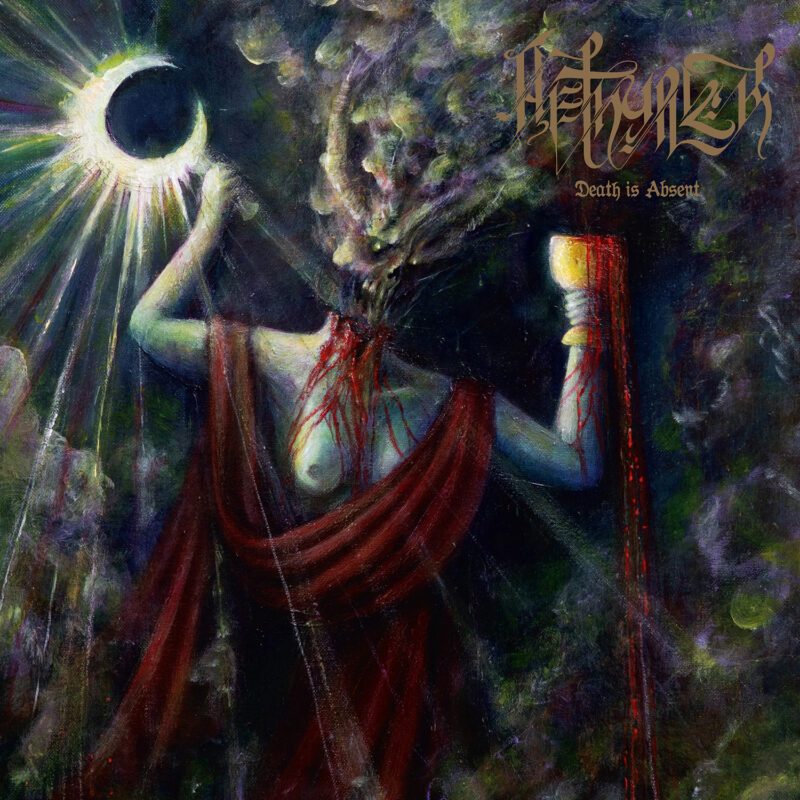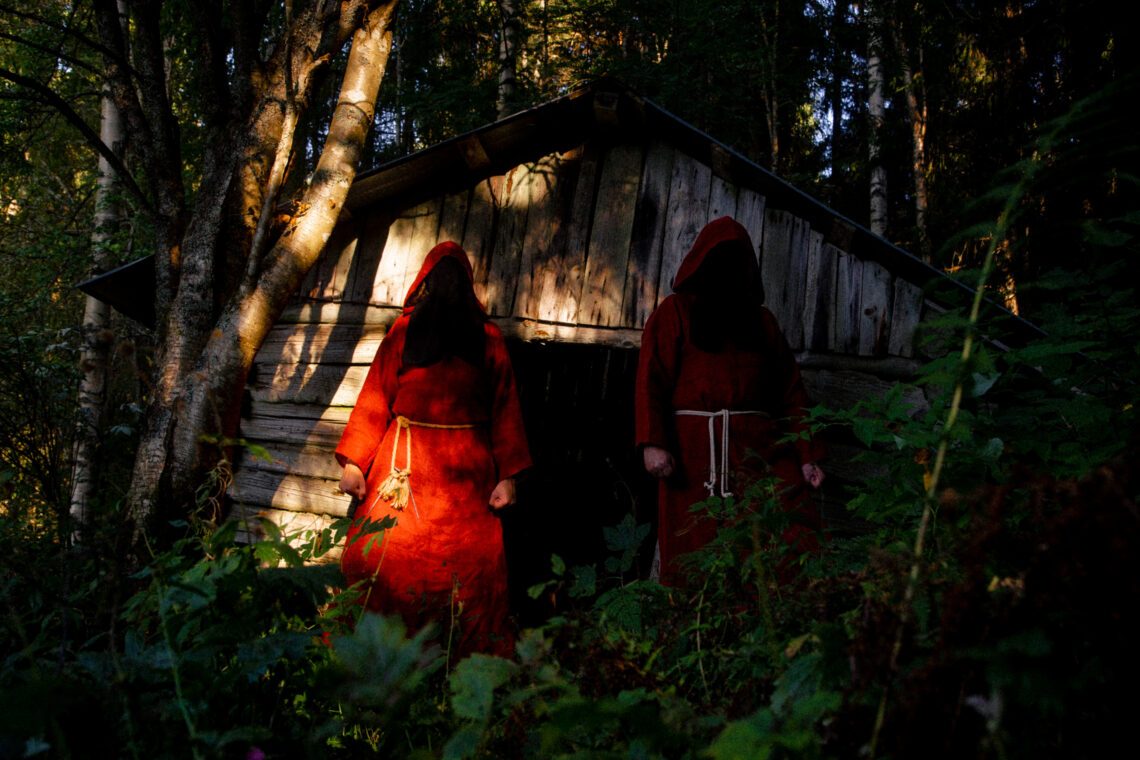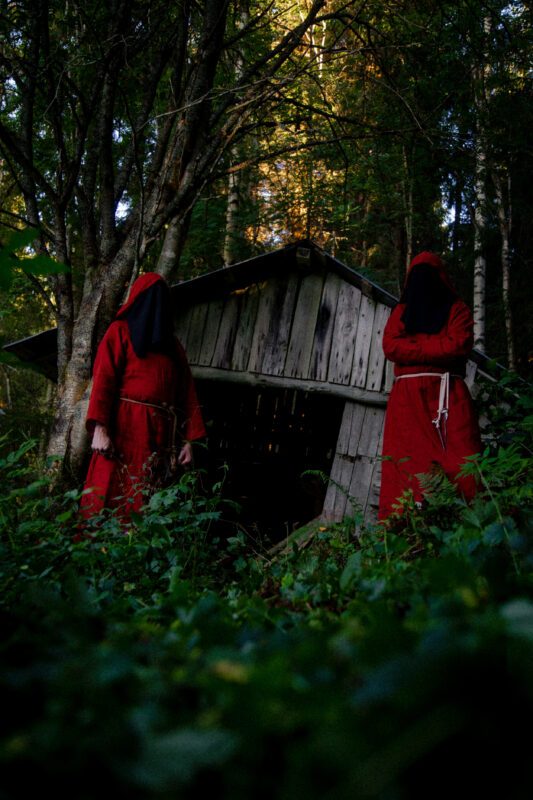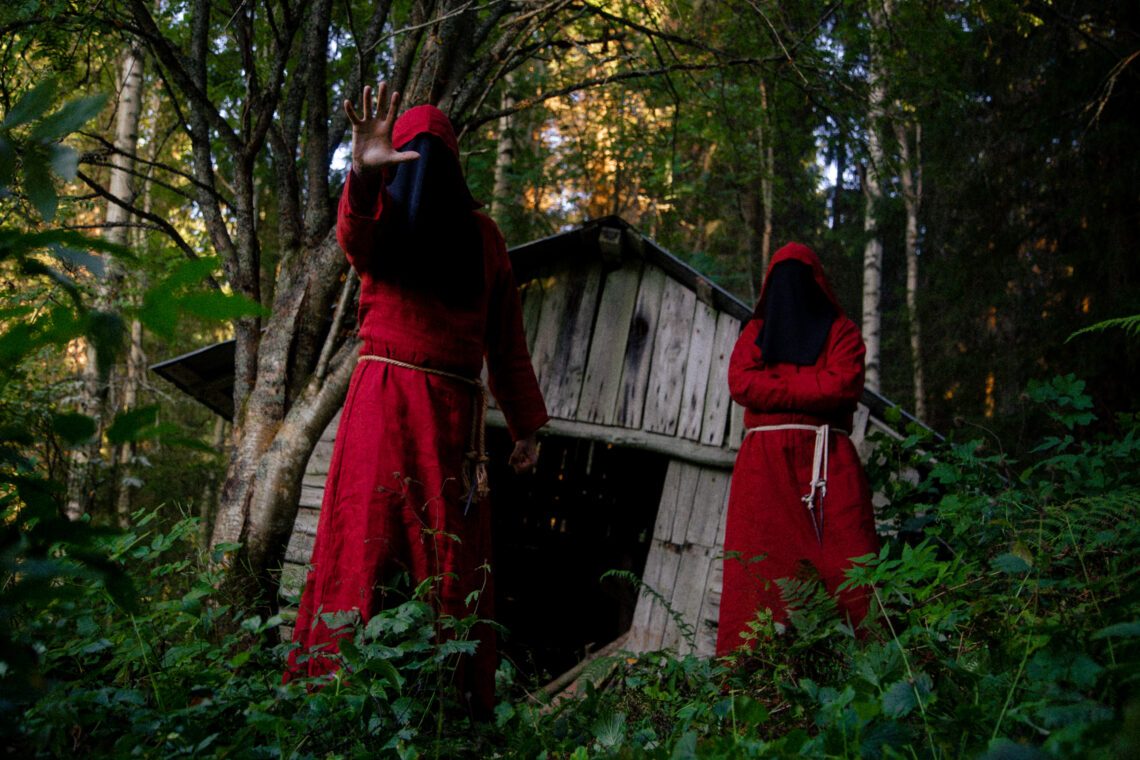AETHYRICK
Death is Absent will be released on September 13. It is AETHYRICK’s fifth album. One could convincingly argue that it is your best album yet, the fruit of a slow and steady maturation of your style.
AETHYRICK – After writing Kolme Veljestä, an EP in Finnish which leaned heavily into atmospheric elements and which was also very midtempo-based even for us, a bit faster songs started to pour out as a result of a semi-subconscious need for balance or perhaps change and development. Also, there had been this urge to write material with a kind of inherently Nordic feeling to it, paying homage to the Scandinavian Black Metal tradition of the 90s as exemplified by the likes of, for example, OLD MAN’S CHILD and GEHENNA, and once this looming impulse was given its opportunity to flourish, the songs Empyrean Silver and The Hands of Fate were born. After those two emerged, the album started to write itself in a way. Although we’ve been quite active on the release front to say the least, we have always composed our songs with zero pressure to get things going fast just so that we’d have at least something to put on our albums. Instead, it has felt more like these songs have been given to us, so to speak, even it might sound like a worn-out cliché.

Your style finds its roots in the Black Metal of the 1990s, a period that left deep scars on many of those who lived through it, at least on an aesthetic level.
I have often wondered if the shock was so significant—almost akin to trauma—that many listeners and musicians engage in what Freud called repetition compulsion. Of course, most people return to what shaped their youth in one way or another; there’s nothing novel about that. But it seems particularly prevalent, even militant, in Black Metal.
AETHYRICK – Black Metal consists of so many different aspects and can evoke so wide a range of emotions in those who embrace it with near-religious enthusiasm that I guess it was always bound to be permanently more than just music for a lot of people. Something that remains a part of your being for the rest of your life. Your theory is a valid one for sure, but I don’t know if I could liken it to a shock myself, though. I’d rather call it a profound bewitchment that sank its hooks into our souls and pulled us straight into an abyss of otherworldly fascination. But regardless of how one chooses to describe it, the fact remains that the effect was tremendous, even lifechanging, to the point of being something you yearn to relive again and again. Stuff like early DEICIDE certainly had its appeal and guided me in the right direction, but when I heard Black Metal for the first time, I instantly felt like I hadn’t felt before. It was like a portal opened before me and I found my way into a world that I hadn’t been actively searching for but that I recognized as my home right away. Generally, a teenager’s sudden and dramatic sensations are hardly indicative of any stable and long-lasting things but this particular virgin encounter proved out to be an exception to the rule as I feel the same even after three decades. Of course, it doesn’t happen with every release I come across, far from it. But the few that manage to resonate with me on a deeper level can still induce that unadulterated feeling of bliss I experienced in my youth. And that selfsame feeling is what we seek to reach through our own material too.

I’m obviously convinced of the value of AETHYRICK’s artistic and spiritual work, hence our collaboration. My personal preference in Black Metal usually leans towards its radical and revolutionary aspects. To put it differently, I immensely respect traditionalism when it comes from the right place, but my heart stands closer to the camp of constant challenge. For context, and as you certainly remember, in the 1990s there was a huge premium placed on personality. What’s your take on that?
AETHYRICK – This is a topic that could be discussed for hours, and all mutations and sidesteps cannot be taken into account, so I have to cut some corners, generalize a lot and stick to observations that relate to what is essential from my personal point of view. Here goes.
One major thing that is fascinating musically in the Black Metal of the 90s is that the songs were quite often more about atmosphere than about technical skill or speed. There was more tempo variation in the songs, sometimes feeling a bit like being improvised, as well as certain abruptness in the arrangements. This is probably because not all were that seasoned musicians at that point and also because it was more or less virgin territory for all these bands that had just started to explore a new musical branch with influences coming from a variety of styles and genres. It all contributed to the immediateness and the sincerity of passion so strongly present in the releases of that era – and these are features that made these releases rather unique.
When it comes to aesthetics, lyrical concepts as well as the music itself, an exhausting amount of new territory has been covered along the way. Some of these ventures have proven to be very fruitful and enlivening while others have been downright embarrassing. Even if we both feel most at home, both as artists and listeners, with the style AETHYRICK represents, there are countless releases that have challenged our established preferences and they have done so with such brilliance that we simply cannot deny their appeal. We are generally open for new, but if it doesn’t strike a chord with us, we can’t cheer for it just because it’s something that hasn’t been done before. Furthermore, if change or innovation is forced, it becomes a mere gimmick without any soul behind it and, frankly, most of the time that’s also all too easy to detect.
As for the evolution of non-musical factors at play, both at the forefront and in the background, I think that when Black Metal as we know it took its first real steps as a genre, it benefited quite a bit from having clear leader figures at the helm as trailblazers to set an example for the rest. The frames needed to be set in order for the whole movement (if you can call it that) to be able to go forward as a force to be reckoned with, otherwise it all might have just fragmented into pieces and fallen into near-oblivion in the end. As we all know, many of these prominent individuals were colourful indeed and their rhetoric made Black Metal even more extreme as a whole and who truly ignited the pyre for good with their extra-musical activities, which gave Black Metal itself huge additional momentum. But once the freight train was moving, the need for such leadership started to diminish. The way I see it, this transition was essential in keeping Black Metal vital, allowing for it to evolve further and, most of all, giving it an opportunity to mature and become more about what is being done and not about who’s doing it.
When more and more individuals embarked on different Occult paths with serious intent, the ideological side of things was steered beyond the somewhat simplistic and at times even juvenile ethos that was fairly prevalent in the 90s, and as a result Black Metal started to gain more spiritual depth. Of course, there are prime examples of this happening already in the early and mid-1990s, but the wider shift in emphasis on the conceptual and lyrical front took place later. Don’t get me wrong, I do think the more straightforward black-and-white approach is not without merit and it still serves a purpose as it can encapsulate some pretty strong outbursts of primitive energy when done right, but personally I am very pleased over the fact that Black Metal is so much more than just one-dimensional Satanism that, in reality, has a bad tendency to be just about employing the right kind of words and imagery without any deeper thought behind it. On a general level, if you write about stuff that just sounds cool to you, you’re only creating entertainment or, if you’re good at it, you can perhaps offer an abundance of food for thought. But if there is something deeper behind it all, something deeply personal, it becomes an extension of your very being, it becomes true poetry or even Magick.
–
AETHYRICK was one of THE SINISTER FLAME’s most emblematic artists. I assume that it felt like the end of an era when NorthWind decided to shut down the label.
AETHYRICK – Yes, it surely felt like a great loss for some time. One of the most striking moments in this respect was when we had to take off the TSF logo from the cover templates. That made the whole situation feel all too real. NorthWind was one of the biggest, if not THE biggest, fan of our material right from the beginning and it was always a great joy to hear his reactions to any new stuff we sent him. And it certainly wasn’t just about the music, the ideological angles were never left in the shadows and it is what forged this union in the first place. He is like a brother to us and we are eternally grateful for the work he has done in order to get AETHYRICK releases out there. Even though this particular turn of events was a negative one, it eventually led to this new alliance with EAL Productions, which is a plot twist we are deeply satisfied with.
–
Central to your work from a conceptual angle is Sabbatic craft. It is a path that clearly resonates with you, given how eloquently you speak about it. Do you recall when exactly you became interested in it and under what circumstances? Could you name one major change that this practice has brought to your life?
AETHYRICK – I was hunting down one missing book from Kenneth Grant’s Typhonian Trilogies when I accidentally came across a listing of Chumbley’s seminal work, The Azoëtia. The listing included quite a few photos of the content itself and reading some of the passages and especially seeing the artwork was like a lightning had hit me then and there. The mystical aura emitted by those sample pages alone was enough to sow the seeds of obsession in me, and in many ways it was actually very similar to what I experienced when I heard Black Metal for the first time. I instantly knew this was very different from and more powerful, at least from my personal perspective, than what I had delved into previously. Getting a copy at a reasonable price turned out to be a toilsome task, but well worth the effort to say the least. When I finally got the book in my hands, it indeed felt like it was alive, like it had a soul of its own. It is a demanding work to decipher and even after over 15 years and numerous reading rounds it still manages to offer something new every time. It is not a holy book meant to be followed word for word nor is it a 101 manual on witchcraft, instead it is a wellspring of inspiration for those who are willing to dive deep into its mysteries and who are aligned with its informing current.
As for the major changes that have occurred in me through embracing this particular path of thorns, I can give you three instead of just one. It has opened my eyes to see how truly alive the nature around me is. Not just on the outer but on the spirit level too. It has made me even more attuned to the flora and fauna of my native soil. In addition to this, it initiated a clear shift in focus in my way to experience all matters Occult and anchored me firmly within the sacred circle, bringing about much needed emphasis on the actual praxis. Finally, and most importantly, it has made me realize my own true path that I am committed to walk ever onward.

Would you agree with the notion of magical quintessence, as expressed by Andrew D. Chumbley among others, who considered that all forms of magic come from a single source? And if you do, could you imagine working with another tradition or current?
AETHYRICK – Both of us do subscribe to this idea, yes. There is a whole spectrum of magical traditions, but they nonetheless tend to approach the same mysteries, only from slightly different angles. All gods, divine myths and the like are masks for the same eternal powers that are made more approachable from the human perspective by being veiled in metaphors and even having anthropomorphic features ascribed to them. Essentially it is all about making yourself receptive to and aligned with what you are attempting to tap into in the way that is most effective for you specifically. In this case it can be said that whichever route you take, reaching the destination is what counts.
This path is ever-changing, it evolves constantly under the feet of those who walk it. The core teachings and methods revealed in the published works of the Cultus Sabbati are the firm bedrock upon which we have built our solitary churches as instructed by personal insight, intuition, dreams and omen alike. Considering all this as well as the fact that this is not a novel thing anymore for either of us, it is very unlikely that we would have the need to look anywhere else in the future. So, if anything, the compass needle will point even more towards what is within rather than to the direction of roads already walked by others.
–
What is your opinion on science? I’m specifically asking from the perspective of Aleister Crowley’s position, which was that magic and science are not mutually exclusive. Crowley believed, in essence, that they were different approaches to understanding the same reality. In your case, I’m inclined to ask how central botany is to your life, given the practical and symbolic importance of plants in your practice.
AETHYRICK – Well, just like Magick, science too is a pretty broad umbrella term and there are so many different branches in this gigantic tree that I must generalize a bit here. I have immense respect for the tireless work done in this field, but I also feel that in some sense science has become a religion of its own for many with its set dogmas and clergy to guard the accepted axioms. There is often also a certain atmosphere of arrogance based on the notion that science can explain everything – or if it can’t, then that thing does not exist. Mankind has uncovered a lot thus far, but there is still much more to learn and to discover – including phenomena we are yet unable to detect by existing scientific means. I am convinced that more and more discoveries on that front will start to overlap with what the spiritual arts deal with.
As for Crowley’s viewpoint, I’m on board with him on this one. After all, the realm of Spirit is not separate from the physical universe but penetrates it and goes beyond it. The underlying motives are very similar in many ways, one of the biggest being the simple desire to know more, but the focus of the scientific community just differs from that of the practitioners of Magick. I don’t know if these two seemingly opposite camps will ever end up working together for the common good of furthering our collective understanding of the mechanics of existence. I hope this would come to be, but I don’t see it really happening because the gap has become a bit too wide to be bridged that easily.
Crowley also propagated the idea of applying the scientific method in one’s magical undertakings to test their validity as well as to assess failure or success. I personally think this principle should be championed by those engaged in magical endeavours. I don’t see analytical thinking as the death of spiritual or religious experiences. On the contrary, it serves to sharpen your focus, it maintains the healthy balance the seekers on the shadowy paths should strive to advocate and it also helps to cast aside unfounded belief in a thing or an occurrence that, in contrast to the initial interpretation, is not true and that can thus be counterproductive or even harmful if it’s cultivated further. In my opinion, one should always be open to all possibilities, even if it might reveal a chilling omen to be just a mundane coincidence.
Regarding the latter part of your question, neither of us can really be called a botanist, but yes, we both incorporate elements of plant working in our praxis. It makes no difference what your angle may be, you can never overlook the science of it. For example, you need to know how to handle certain plants properly to avoid poisoning. In its current form, the use of plants in our case is mostly centered around incense and libation. It serves an important role in our devotional workings, but it is not the main focal point for either of us.
–
Are you sympathetic at all to ecology, and perhaps more specifically to the so-called deep ecology as theorized by the late Norwegian intellectual and activist Arne Næss?
AETHYRICK – Absolutely. I am not an eco-warrior but I do find myself agreeing with the core notions of deep ecology. The whole idea of reducing nature to a mere asset for us to exploit and benefit from is alien to me. Furthermore, seeing entire ecosystems being sacrificed on the altar of constant economic growth feels unbearable. And even if all this is quite evident for everyone, blind excess consumerism blooms everywhere you look. Order cheap shit you don’t even need, use it once, throw away, repeat. In the light of all this, I see very little hope for our species in its current state. I think things will have to get much worse before they can get any better.
Yet still, no matter how drastic changes we make on an individual level, it is all just a drop of clean water in the bottomless ocean of filth. It’s not nothing, but it’s not enough. I applaud people’s attempts at self-sustainability, but living in a cottage without electricity becomes all too easily nothing more than simple “I’m better than others” wankery that has just a microscopic impact on anything while factories around the globe keep shoveling more and more poison down Gaia’s throat with zero regret.

A while ago, I read Phil Baker’s biography of Austin Osman Spare—a brilliant book I might add. I’m loosely paraphrasing here, but at some point Baker reports that Spare was widely recognized among fellow esotericists as one of the very few who had the capability to make things happen, by means of magic that is.
Yet Spare lived most of his adult life in poverty, and his artistic work was largely ignored. This led me to ponder the life of Eliphas Levi, who never had a penny to his name and struggled severely throughout his life. Aleister Crowley then came to mind. He spent most of his father’s inheritance early on and lived his final years largely dependent on the financial largesse of his followers.
These men’s works are largely recognized as influential in esoteric circles—yet from a certain perspective, they displayed a severe inability to navigate normal life and to change their fates through esoteric means. Is there a lesson to be learned here, perhaps?
AETHYRICK – There is a saying that true art comes from suffering. Maybe the fates dictate that only ragged clothes and empty stomachs make Magick thrive? In all seriousness, my personal observation is that many people with strong artistic abilities aren’t exactly masters in managing their everyday lives. The same seems to be true when it comes to some of the greatest names in the history of the Occult. Perhaps they tend to dwell more in the abodes of Spirit than in the mundane world and therefore the ability to juggle the challenges of everyday life is lacking from the equation. But no matter what medieval grimoires might lead people to think or how accomplished a sorcerer one may be, get-rich-quick spells just don’t work. Magick is the subtle art of transformation, transformation that first and foremost takes place within oneself, it cannot make a sack of cash appear from thin air or give you the correct lottery numbers in advance.
–
Your lyrics have always had a certain poetic quality to them. The last song on your new album, Only Junipers Grow On My Grave, ends with the following words:
Water that flows not
Is devoid of true life
Only in wisdom passed on
The song of spirit goes forth
What would your legacy be, ideally?
AETHYRICK – By keeping our own pyres raging, there is a good chance their sparks will spread further. Even if only one new fire is lit as a result, we are pleased. We mainly focus on our personal steps on the path but we also seek to inspire others as a sort of a byproduct of it all. Be it through a fruitful discussion, by leaving our own humble mark in the pageless book of Sorcery, or through the art we create in AETHYRICK.
